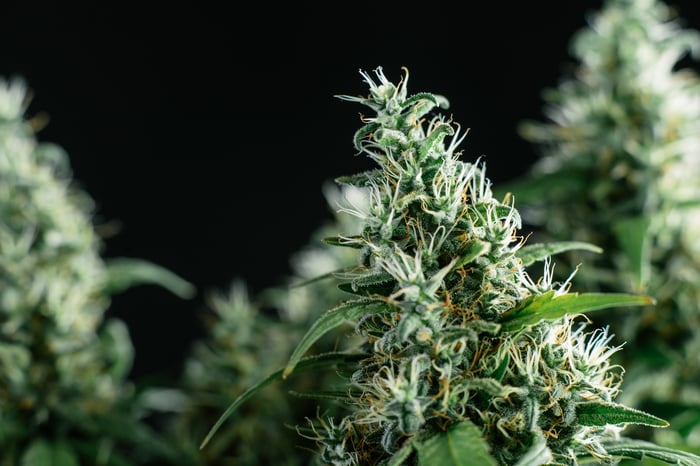This year has truly been a tale of two halves for marijuana stocks. During the first three months of 2019 cannabis stocks were virtually unstoppable, with more than a dozen pot stocks gaining at least 70% in the first quarter. Since then, it's been a precipitous and fairly steep downtrend for marijuana stocks, with virtually no popular names spared.
For example, the world's most popular marijuana stock, Aurora Cannabis (ACB -1.48%), was up nearly 90% on a year-to-date basis by mid-March and sported an almost $10 billion market cap. Today, the company sits lower by 53% on the year and has a market cap of $2.5 billion. With this highly held stock hitting levels we haven't seen in more than two years, you might be wondering if this is the time to buy into Aurora. Let's take a closer look at both the buy and avoid arguments and then weigh in.

Image source: Getty Images.
The buy thesis
To begin with, Aurora Cannabis projects as the production leader throughout Canada, and possibly the world. Assuming all 15 of the company's cultivation farms were built out and fully operational, Aurora would have a real shot at hitting 700,000 kilos of peak annual run-rate output. Such robust production would not only make Aurora a go-to source for long-term supply deals, but it should be a positive in terms of reducing production costs via economies of scale.
To build on this point, not only is Aurora a production leader with potentially attractive per-gram growing costs, but its cannabis yield per square foot at its largest campuses should be handsomely above the industry average. As an example, the company had forecast at least 230,000 kilos of run-rate annual output at Aurora Sun in Alberta from 1.62 million square feet of cultivation space. That's roughly 142 grams per square foot (psf), which is well above the 75 grams psf to 125 grams psf that most of its peers are forecast to produce.
Aurora is also a leader on the international scene, where it has a production, export, research, or partnership presence in 25 countries, including Canada. Canopy Growth and Tilray are the only other growers to have a presence in at least one dozen foreign countries. These 24 foreign countries for Aurora are external sales channels that should come in particularly handy if and when dried flower production in Canada becomes oversupplied and/or commoditized.
And let's not forget that Aurora Cannabis has billionaire activist investor Nelson Peltz working in its corner as a strategic advisor. Peltz has keen knowledge of the food and beverage industry, which should come in handy given Aurora's desire to enter the cannabis-infused beverage and edibles space. At this point it just seems like a matter of when, not if, Aurora will forge a partnership with a brand-name food or beverage company.
But not everything is peaches and cream with Aurora Cannabis.

Image source: Getty Images.
The avoid thesis
On the other side of the aisle, Aurora Cannabis is contending with regulatory and procedural issues in Canada that will negatively impact its business for the foreseeable future. More specifically, Ontario has slow-stepped the rollout of physical dispensaries, which is providing too few outlets for growers to sell legal product. Ontario is home to almost 2 out of 5 Canadian residents.
With these factors beyond Aurora's control, the company has turned to production cuts as a means of reducing its expenses and aligning output with demand. Aurora has completely halted construction on Aurora Nordic 2 in Denmark, and has stopped construction on Aurora Sun. Next year, just six grows rooms spanning 238,000 square feet at Aurora Sun will be in use. This effectively halves the company's peak run-rate output.
Not surprisingly, Aurora's revenue and profit expectations have also been thrown out the window. The company had initially targeted the fiscal fourth-quarter of 2019 as the period where it would push into positive adjusted EBITDA (earnings before interest, taxes, depreciation, and amortization). Now it could be a while longer, with Wall Street suggesting that losses may continue until fiscal 2022.
This is also a company with an ugly balance sheet. Unlike some of its peers, Aurora hasn't landed an equity investment, and is therefore not sitting on a robust pile of cash. At the same time, goodwill from its more than one dozen acquisitions since August 2016 has ballooned to around $2.4 billion, or 57% of total assets. It seems unlikely that Aurora Cannabis will recoup much of this goodwill, which could eventually lead to a massive writedown.
Finally, Aurora's management has continually shown little regard for its shareholders. With cash being hard to come by, Aurora has often turned to share issuances to raise capital or fund buyouts. Over the past 21 quarters (five years, three months), Aurora's share count has skyrocketed from 16 million to what I suspect is north of 1.1 billion following a share issuance tied to a convertible debt offering.

Image source: Getty Images.
The verdict
Now that you've had a glimpse at why Aurora Cannabis could be worth buying or avoiding, let's return to the important question at hand: With Aurora down 53% on a year-to-date basis, should you be a buyer?
My answer? No.
While there are clear competitive advantages in terms of output and production cost, as well as an enviable international presence, none of these advantages comes into play until Canada resolves its supply issues, and that's going to take quite some time. With these supply problems ongoing, Aurora's superior production potential is rendered useless. Further, with most foreign countries still in the process of establishing their medical marijuana regulations, it's not as if Aurora can simply export weed overseas while it waits for Canada to fix its problems. In other words, losses are almost guaranteed through fiscal 2020 and maybe fiscal 2021.
What's more, Aurora's balance sheet is a total mess. With the value of a potential goodwill writedown nearly equal to the company's market cap, it's quite possible Aurora has additional downside in the months or quarters that lie ahead.
Though it's possible we see a quicker turnaround than anticipated in the cannabis space, it's very evident that a maturation of the industry is sorely needed. That makes Aurora Cannabis a stock to avoid for the time being.





